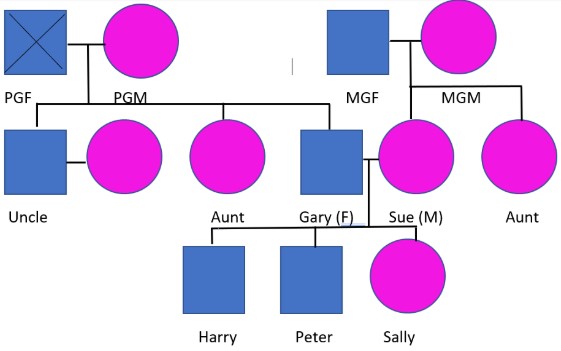Case Study: Harry Harrison NUR3025
- Subject Code :
NUR3025
- University :
University of Southern Queensland Exam Question Bank is not sponsored or endorsed by this college or university.
- Country :
Australia
Case Study: Harry Harrison
Profile
Facility: UNISQ Acute Mental Health Unit
URN: USQ34587
Given Name(s): Harry
Surname: Harrison
Address: 12 Agency Lane, Ipswich
DOB: 03/03/2007
Sex: Male
Genogram
Harry's mother Sue has provided the following information regarding the familywith a genogram:
Lives in an intact family.
Harry is the eldest of 3 children 1 younger brother and sister.
Paternal Grandfather suffered from PTSD secondary to army services overseas.
His paternal Aunt has a Hx of depression and anxiety
Mother suffered PND depression after the birth of her youngest child, Sally

Background
Harry is an 18-year-old high school student, currently in his senior year at a local public school, who was presented by QPS (Queensland Police Service) to the Emergency Department for an assessment.
This occurred after police received a phone call from a concerned bystander who had observed Harry running repeatedly into the path of traffic on a busy inner-city street.
Police reported that on their arrival, Harry was standing on the road semi naked, gesturing wildly, laughing, and shouting at the cars driving by.
On approach, Harry did not acknowledge the police and refused to return to the footpath. He shouted out that nobody can hurt me because I am invisible! To ensure that Harry remained safe, the police physically escorted him from the road.
Harry was uncooperative and physically aggressive and during the struggle to get him to safety. During the struggle Harry dropped a small plastic bag of white powder. The police decided to take Harry to the nearest hospital under the Public Health Act - Emergency Examination Authority, as Harry was refusing to voluntarily to be transported, medically assessed, or agree to a mental health assessment.
At the hospital, Harry refused to enter into any discussions with staff. Emergency staff located Harrys wallet in his clothing and contacted his mother who promptly arrived.
His mother, Sue, gave a recent history of Harrys behaviour at home and described a significant decline in his academic and social functioning over the past couple of months. His attendance at school had declined in the same period of time, whereas prior he was an active student engaging in sport and was academically achieving sound grades. A friend of his from his local sporting club had died by suicide approximately 6 months ago, which she felt may have been the precipitant to his current presentation. Harry had voiced a career pathway in joining the army.
Sue reported that his sleep has been disturbed, and that he is often awake all night. She noted that his mood was being displayed as fluctuating between being subdued and sad to angry and then violent with no apparent cause.
Despite Harrys denials, she stated that she has suspected drug use and even found some injecting paraphernalia in his bedroom. Sue also mentioned that earlier in the day, he had been acting strangely at home, and expressed fears that his younger brother was making him ill. There had been some minor aggression towards his brother and when his parents had attempted to intervene, with police be called to attend the household on 1 occasion, but no charges were laid.
Sue described that this morning Harry had left home abruptly without stating his intentions.
After the assessment was completed with the psychiatrist, a Recommendation for Assessment was initiated and an admission was arranged for Harry to the Acute Mental Health Unit. Alongside the admission and Recommendation for Assessment, the admitting psychiatrist has prescribed Harry an antipsychotic medication.
Strengths and Recovery
Harry has demonstrated several personal strengths and attributes that can be pivotal in his treatment and recovery. Despite recent challenges, Harry's history of academic achievement and active participation in sports highlights his resilience, discipline, and ability to set and achieve goals. These qualities suggest a strong work ethic and a capacity for perseverance, which can be harnessed in his recovery journey.
Harry's aspiration to join the army reflects his desire for structure, purpose, and service. This goal-oriented nature can be a significant motivator in his treatment, emphasizing the importance of mental and physical health in achieving his career aspirations. His ambition indicates a willingness to commit to long-term objectives and a readiness to embrace the discipline required for such a career.
In terms of treatment goals, Harry aims to regain stability in his daily life, improve his mental health, and reduce substance use. He seeks to re-establish healthy sleep patterns, manage his mood fluctuations, and rebuild his relationships with family and friends. Harry is also focused on developing coping strategies to deal with stress and grief, particularly related to the loss of his friend.
Context for Assessment Two
You are a graduate nurse working in the Acute Mental Health Unit and will be conducting Harrys admission to the unit.
As Harrys allocated RN, over the course of your shift you begin to collaborate with Harry on his recovery plan.
For the purposes of your clinical handover document, you are writing this from the perspective of the admitting and allocated nurse handing over to the next shift.

